現在位置
- Yokohama-shi Top Page
- Isogo Ward Top Page
- Living, procedures
- Community Development and Environment
- City Planning
- Introduction of Horiwari River
Last updated on March 14, 2025.
The text is from here.
Introduction of Horiwari River
With the development of Yokohama Port, the Horiwari River, completed in 1874, was used as a boat route connecting Yokohama Port and Negishi Bay from the Meiji era to the Showa era. Wharfs were lined up at the estuary, and lodgings, shipyards, and factories were lined up along the river, and it was said that the bustle was seen.
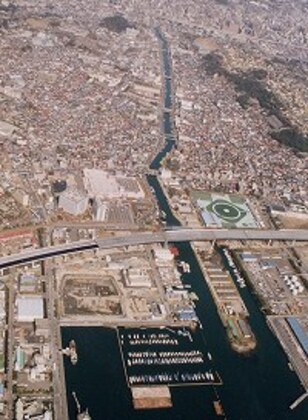 Full view of the Horiwari River (from the mouth to the upstream)
Full view of the Horiwari River (from the mouth to the upstream)
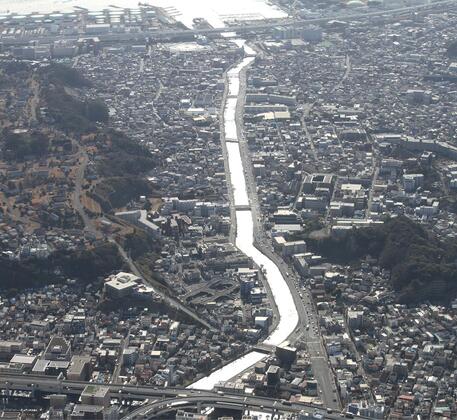 Full view of the Horiwari River (from upstream to the mouth of the river)
Full view of the Horiwari River (from upstream to the mouth of the river)
Brochure "Let's find a more wonderful Horiwari River" (created in 2024) Surface (PDF: 2,444KB)
Brochure "Let's find a more wonderful Horiwari River" (created in 2024) Back side (PDF: 3,361KB)
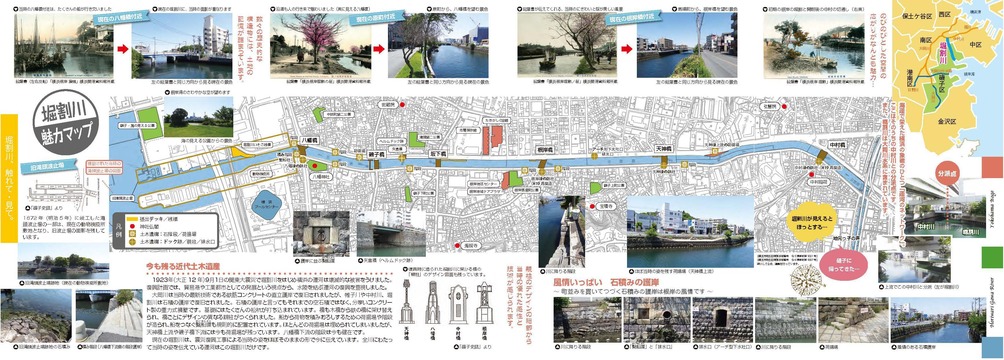
The middle surface of the pamphlet "Let's find a more wonderful Horiwari River"
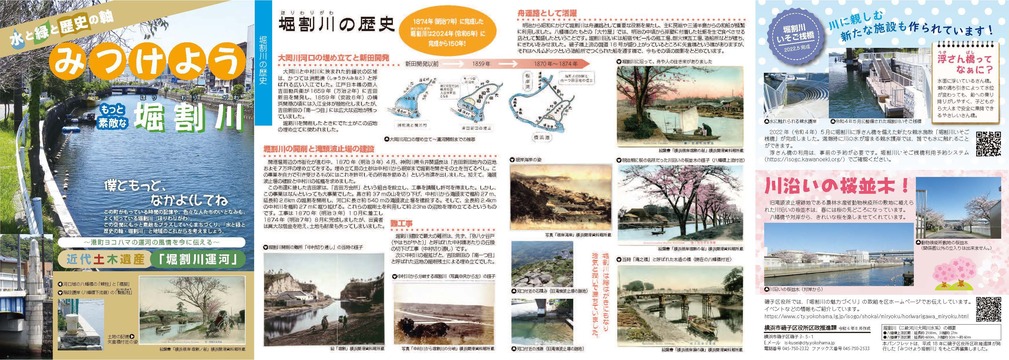
The surface of the pamphlet "Let's find a more wonderful Horiwari River"
Event of Horiwari River
The event is introduced on the Horiwari River charming page.
Click here for the page to create the charm of the Horiwari River.
Profile of Horiwari River
Overview of Rivers
Horiwari River, a second-class river, Ooka River
The Horiwari River is a population canal that diverts from Nakamurakawa near Kuraki Bridge and Ikeshita Bridge and pours into Negishi Bay.
Bridge: From the upstream, Nakamurabashi, Tenjinbashi, Negishibashi, Sakashita Bridge, Isogobashi, Yahatabashi
Rivers under the jurisdiction of Yokohama Kawasaki Flood Control Office (outside site)
History of the Horiwari River
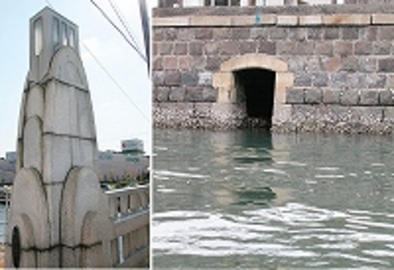
Civil engineering heritage structures
The Horiwari River started construction in 1870 and completed in 1874, and has played a role as a boat route connecting Yokohama Port and Negishi Bay.
Takigashira Wharf was also built on both banks of the estuary, and was completed in 1872. (The current location of the animal quarantine station of the Ministry of Agriculture, Forestry and Fisheries is one side of the wharf.)
Due to the Great Kanto Earthquake of 1923 (1923), the revetment was destroyed, bridges were dropped and burned down, but the reconstruction project in the early Showa era was restored with masonry seawalls, and unloading sites in various places And stairs were made. An elaborate main pillar is installed on the bridge, and it still retains its old features.
It was certified as a civil engineering heritage selected by the Japan Society of Civil Engineers in 2010.
The living things of the Horiwari River
The Yokohama Green Environment Bureau Institute of Environmental Science conducts biological surveys in coastal waters in Yokohama.
Of the creatures confirmed in the survey of the Horiwari River estuary and inner bay, the main creatures are introduced with photos.
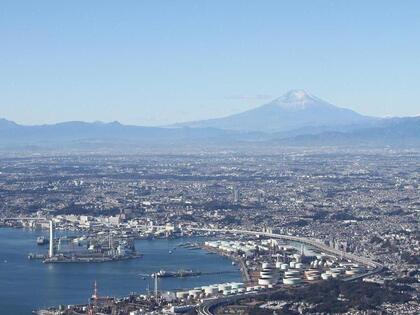 Isogo Ward seen from Negishi Bay
Isogo Ward seen from Negishi Bay
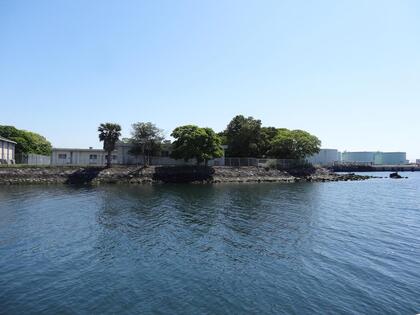 Near the mouth of the Horiwari River
Near the mouth of the Horiwari River
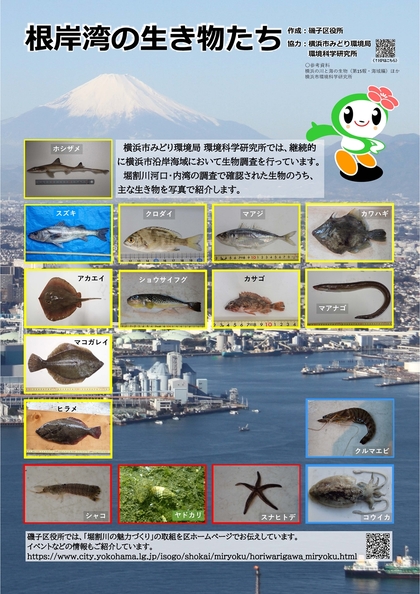 The creatures of Negishi Bay
The creatures of Negishi Bay
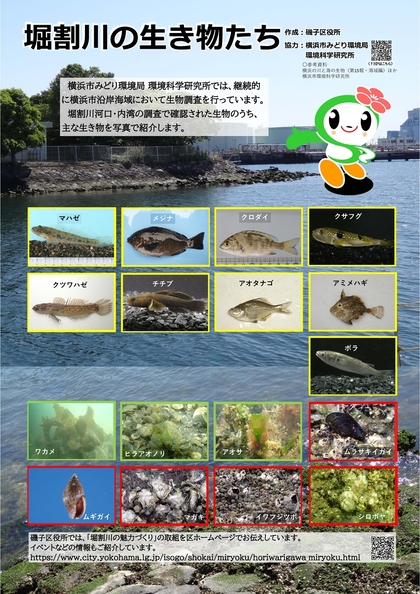 Creatures of the Horiwari River
Creatures of the Horiwari River
Creatures of Negishi Bay (PDF: 5,522KB)
Creatures of Horiwari River (PDF: 6,832KB)
Click here for the website of the Green Environment Bureau Institute of Environmental Science.
You can see the survey report "Lives of the River and the Sea of Yokohama".
Along the Horiwari River
Along the river, there are various facilities that convey the history of Yokohama since the Meiji era. In addition, sports facilities are scattered, and schools for children are being implemented.
Animal Quarantine Station, Ministry of Agriculture, Forestry and Fisheries
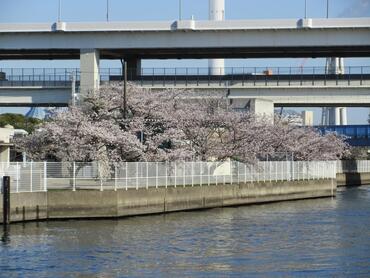
A row of cherry blossom trees at the Animal Quarantine Station
As the headquarters of animal quarantine stations nationwide, we conduct tests for infectious diseases and pests of animals coming from overseas.
The row of cherry blossom trees along the river is a highlight of cherry blossoms in spring, and although you cannot usually enter the premises, it is a famous cherry blossom spot that delights from Yahatabashi and the opposite bank.
Yokohama tram preservation hall
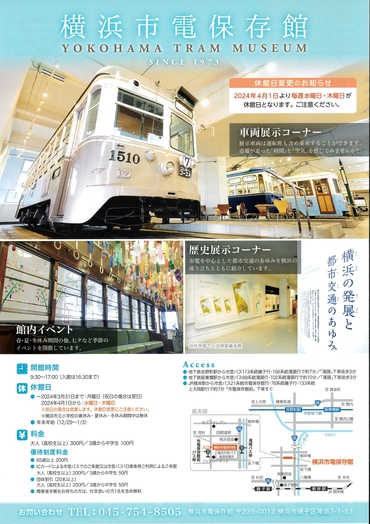
Yokohama tram preservation hall
For about 70 years from 1904 to 1972, you can see the streetcar, which was popular as a foot of Yokohama citizens, in its appearance at that time.
Opening hours from 9:30 to 17:00 (admission until 16:30)
Closed days Every Wednesday and Thursday (open on holidays, no transfer closed) New Year holidays (12/29-1/3)
Admission fee Adults (high school students and above): 300 yen / Junior high school students from 3 years old: 100 yen ※Payment will be made in cash only.
[Notice of Change in Hall Time on Weekdays (From April 7, 2025)]
From Monday, April 7, 2025, the opening hours on weekdays have been changed from 10:00 to 16:00 (admission until 15:30).
Admission ※From 9:30 to 17:00 (entry until 16:30) during weekends and holidays and summer vacation at Yokohama Municipal Elementary Schools.
City Electronic Preservation Hall Flyer (PDF: 2,307KB)
Yokohama streetcar preservation hall HP (outside site)
Negishi Tennis Garden (Yokohama Pool Center site)
Near the estuary, "Yokohama Pool Center" was set up in 1965, and many citizens enjoyed it, but business has been suspended since 2021 due to aging facilities.
A part of the premises is used as the "Negishi Tennis Garden", and junior classes are also held by "Dunlop Indoor Tennis School Negishi".
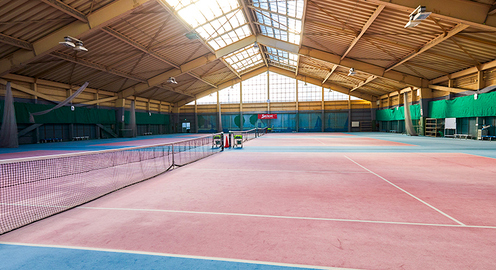 Negishi Tennis Garden (in Yokohama Pool Center)
Negishi Tennis Garden (in Yokohama Pool Center)
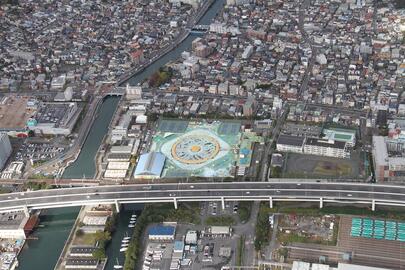 From the sky (Yokohama Pool Center)
From the sky (Yokohama Pool Center)
HP Negishi Tennis Garden Event Information (in Yokohama Pool Center) (outside site)
Takigashira Hall
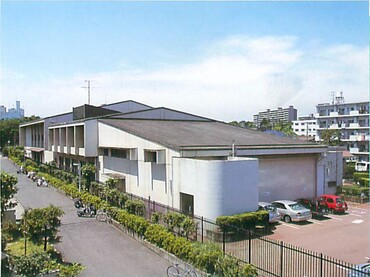
The Takigashira Hall is a cultural and physical education facility with a gymnasium, martial arts hall, training room, hall, meeting room, etc.
It is used as a practice venue for the professional basketball team "Yokohama B Corsears", and sports classes for citizens are held.
Takigashira Hall (outside site)
Horiwari River Isogo Pier
In May 2022, a new hydrophilic facility "Horiwari River Isogo Pier" with a floating bridge on the Horiwari River was completed!
Please use it as a place where you can get close to the river!
〇 Facility name: Horiwari River Isogo Pier
〇 Facilities: Waterfront facilities, Ukisanbashi, unloading Sanbashi
In Kanagawa Prefecture, we are developing hydrophilic facilities in cooperation with town development in order to enhance the attractiveness of the town by utilizing the Ooka River water system rivers.
The hydrophilic facility also has a floating bridge and a unloading bridge, which is expected to be used for revitalizing water recreation, creating bustle in the town, and transporting goods in emergencies.
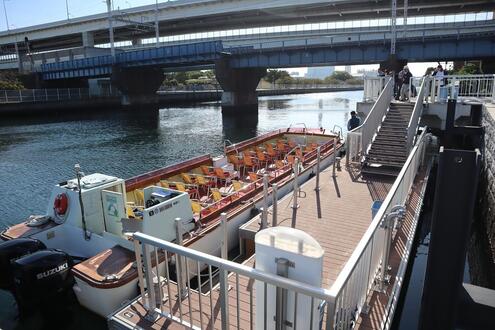 Horiwari River Isogo Pier
Horiwari River Isogo Pier
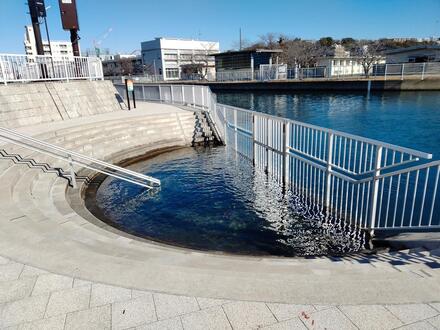 Waterfront Plaza
Waterfront Plaza
Ukisanbashi is locked with an electronic key for safety management. Advance reservations are required for use by the Kanagawa Prefectural Flood Control Office.
In the case of use, please make advance reservation from prefecture homepage.
Civil engineering heritage selected by the 22, Heisei Society of Civil Engineers
In November 2010, it was certified as a civil engineering heritage by the Civil Society of Japan in 2010.
Reason for Certification
The Horiwari River, which was excavated in the early Meiji era and diverted from the Ookagawa River, played a major role in water transport and flood control measures in Yokohama City, and the long masonry revetment left a remnant of the time.
Civil engineering heritage selected by the Japan Society of Civil Engineers (external site)
The certification system for civil engineering heritage selected by the Japan Society of Civil Engineers was established in 2000 with the aim of contributing to the preservation of historical civil engineering structures through the recognition of civil engineering heritage. In 2010, 27 structures nationwide, including the Horiwari River, were certified as "civil engineering heritage."
Japan Society of Civil Engineers (outside site) (to the website of the Japan Society of Civil Engineers)
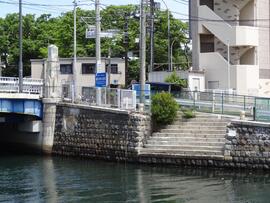
Stair revetment near Yahatabashi
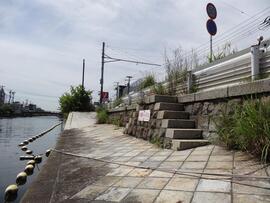
Unloading site upstream of Tenjinbashi
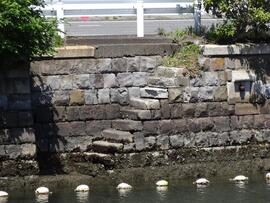
Stairs going down the river

Masonry seawall
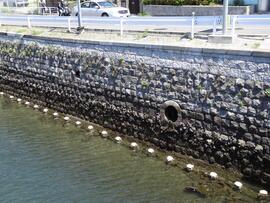
Masonry seawall
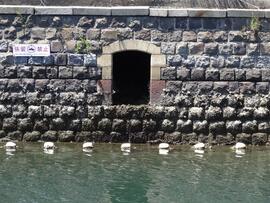
Drains
Improving the charm of Horiwari River! Workshop (FY2004)
In 2004, in order to discover and organize the charms of the Horiwari River, etc., and to make the waterside more familiar, "Improve the appeal of the Horiwari River! Workshop was held. I would like to introduce the contents of this workshop.
Three Factors of the Horiwari River
1.Historical charm and civil engineering heritage
- Beautiful main pillar design
- Masonry seawall with the taste of reconstruction after the earthquake
- The only remaining landing site in Yokohama
- The trace of Helm dog
- Shipbuilding ring
- Design of sewage outlet
2.Space and Landscape Attraction
- Spacious space, water surface
- The Road of the Wind
- Scent of the tide
- Scenery from the bridge
- A row of cherry trees and willow trees
- Green of cliffs
3.Attractiveness as a living space
- Staircases falling on the surface of the water
- Famous spot for goby fishing
- I feel that I'm back to Isoko
- Be relieved
- I feel the proximity of the sea
Points (ideas) to be important for improving attractiveness
Take care of history
It inherits the civil engineering heritage of the reconstruction of the earthquake, such as the masonry seawall, the main pillar, and the ruins of Helm dog.
Take care of the scenery
Protect clean water, taking care of prospects, openness, closeness of the water surface, wind, and protecting clean water.
Use the water surface
Open events such as canoes, rafts, water restaurants, etc., where you can use the water surface from where you can.
Experiments and surveys
One-day pedestrian paradise, one-way social experiment, traffic volume survey
Make rules
Scenic Guidelines for Illegal Mooring and Seawalls
You may need a separate PDF reader to open a PDF file.
If you do not have it, you can download it free of charge from Adobe.
![]() To download Adobe Acrobat Reader DC
To download Adobe Acrobat Reader DC
Inquiries to this page
Isogo Ward General Affairs Department Ward Administration Promotion Division
Phone: 045-750-2335
Phone: 045-750-2335
Fax: 045-750-2532
E-Mail address is-kusei@city.yokohama.lg.jp
Page ID: 508-089-249












